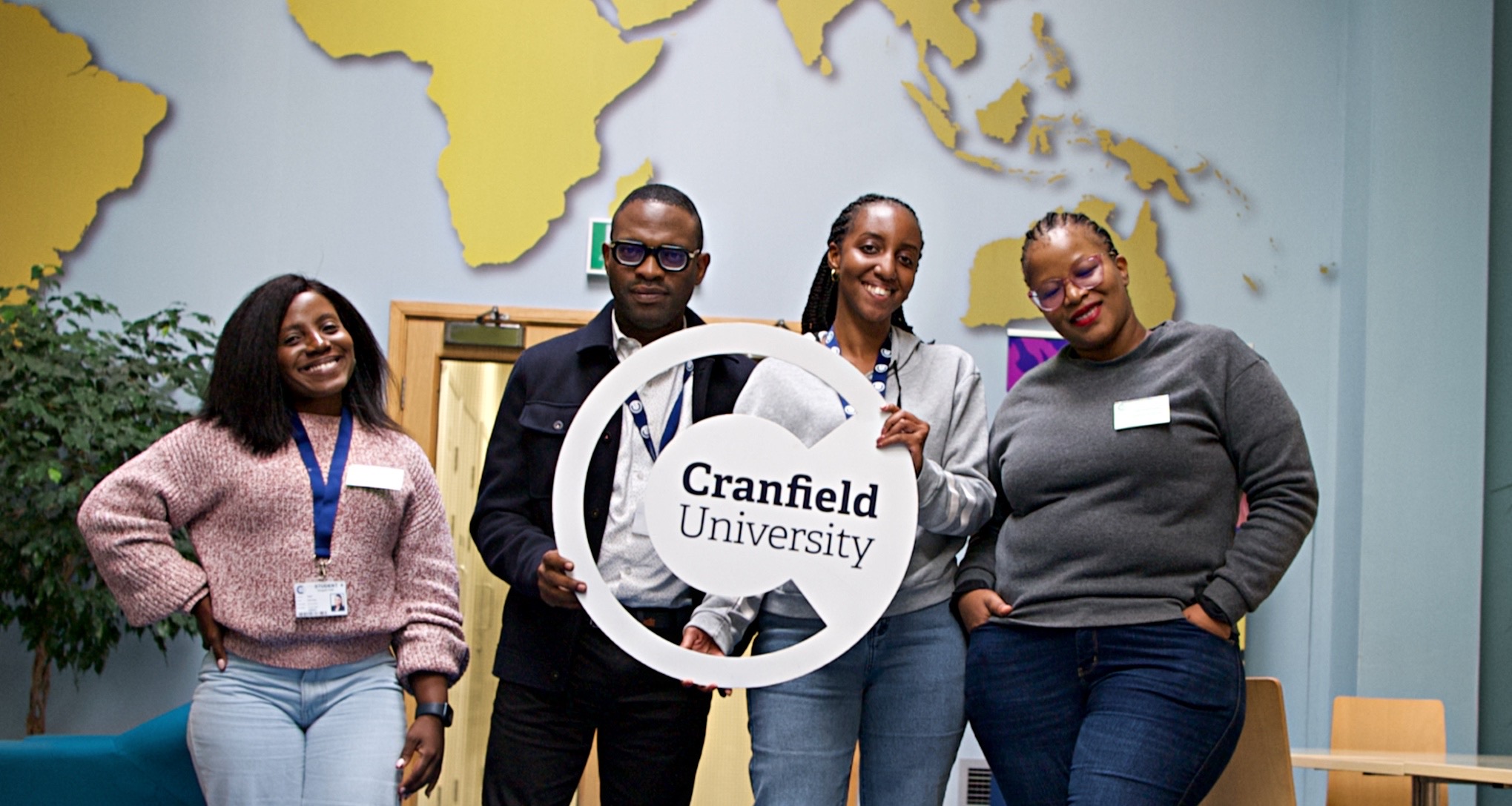Lets make things better AND make better things – KTN’s mantra for manufacturing’s sustainable future
27/11/2020

Ben Peace is Head of Manufacturing at KTN UK. A UK-wide network, KTN connects ideas, people and communities to respond to major challenges and drive positive change through innovation. Ben, who sits on Cranfield University’s Manufacturing Council, is looking forward to giving a keynote speech at the forthcoming National Manufacturing Debate on Wednesday 2 December, as part of Cranfield’s week-long Manufacturing and Materials event.
KTN’s mission is to help industry make things better, and (just as important) make better things. Certainly decarbonising the manufacturing industry is about creating sustainable production processes – but with Ben’s background in product design, he believes sustainable manufacturing also demands ensuring our carbon investment is in the right products; and that the UK has the strengths to deliver on this vision as part of its transition to ‘Industry 4.0’.
Through-life engineering to increase value
Through-life engineering is a pivotal topic for KTN, Cranfield and the wider manufacturing community. It addresses the needs of high-value products and systems from conceptual design all the way to end of life – and beyond. High value products such as those created for jet engines, rail infrastructure, and the military for example, by their very nature are designed to be easy to service and repair, and have embedded sensors that enable the tracking of performance during service. This creates a virtuous circle where it is in everyone’s interests to make the engine’s design better and better over iterations, increasing efficiency, and delivering ever-increasing utility and positive impact for society. The key is to evolve a system around the product to enable value to be optimised and retained.
Ben explains: “We are seeing the know-how from these sectors ‘diffuse’ into somewhat lower value products such as office furniture, lighting, and IT. This results in products that deliver more and more utility to genuine customer and societal needs, rather than creating ever more disposable, throwaway products.”
A timely debate
This year’s National Manufacturing Debate is taking place during a time where we see multiple converging topics all driving change at once; from the moving towards net zero, to Brexit, as well as a global pandemic. In times of change innovative businesses see this as an opportunity – to differentiate, to become more resilient. And it is time to build back better.
While not a new theme, Ben is passionate about how we in the UK focus on our strengths to create the higher value mentality introduced above. Rather than competing with nations with lower labour costs such as in South East Asia, we should be exploiting recognised UK strengths to deliver that vision – in product design, understanding the customer journey, as well as enabling technologies like immersive technology, big data and artificial intelligence (AI).
There is a strong connection between the drive towards net zero and through-life manufacturing of high-value products. As Ben explains: “Net zero is about making the process more efficient on one hand, but it is also about making the right choices about how we use the carbon investment. Higher value, through-life products that last and can be upgraded, make products worthwhile in terms of the environmental investment.”
Tackling major industry challenges
KTN is working with the automotive sector to help to build supply chains to bring stakeholders together for electric vehicles – from batteries, motors, and complex electronics to control systems. KTN is helping bring in notions of through-life design and engineering, and circular economy, enabling valuable materials to retain their value and utility. Accelerated by the forthcoming ban on the sale of internal combustion engines announced in November 2020, there is a coming wave of electric propulsion.
KTN is also working with the Department for Business, Energy and Industrial Strategy (BEIS) on the Industrial Energy Transformation Fund (IETF) to tackle efficiency. So far KTN and BEIS has helped 86 applicants into the IETF, from multiple sectors and regions, applying for £60 million in funding to adopt energy efficiency technologies.
Changing behaviours
Ben is passionate about technology and what it can deliver, but also champions the central importance of changing behaviours, business models and systems. Can we make products that are easier to upgrade? How can we change customer behaviour?
Industry 4.0 transferring knowledge to new sectors
KTN recently commenced delivery of a four year programme to join up strands of the “Manufacturing Made Smarter” Industrial Strategy Challenge Fund, making this new wave of technology – robotics, AI, internet of things (IOT) – more visible and accessible to industry. Ben explains: “There is so much talk about the 4th industrial revolution, and many threads and disciplines that need to be woven together to deliver this – joining up sectors and the value chain – design, manufacturing, usage and end of life. As part of the delivery of our networking we ensure a green digital thread. And thus with the right support Industry 4.0 can and will be a key enabler of achieving net zero.”
He continues: “Certainly we need research – the ideas, academic studies – but we also need to think about adoption. How can we transfer knowledge from likes of Rolls Royce and their high value jet engines to new sectors?”
Ben offers some real-world example of through-life manufacturing: For example Rype Office is a sustainable office company. While not quite on the same scale, they are deploying a service-led approach that echoes Rolls Royce’s. They take quality office furniture that has reached the end of its first life, remanufacture it and then sell it again to a new customer.
To hear more about Ben’s views on how momentum is gathering on through-life and sustainable high-value manufacturing, sign up to the National Manufacturing Debate on Wednesday 2 December, 2-4pm GMT.
www.national-manufacturing-debate.org.uk
You’re invited to submit questions in advance, throughout the event that you would like to be put to panellists during the debate. The debate question is: Is British manufacturing ready to seize the net zero opportunities and is it really possible for decarbonisation to enhance the UK’s competitiveness? We’ll be using the Vevox platform which is simple to use:
- Go to: vevox.app on your PC or mobile device (no need to download any apps, just search for ‘vevox.app’ in your browser);
- Enter meeting ID: 154-480-074;
- Click on the speech bubble icon to pose your question/s.
Categories & Tags:
Leave a comment on this post:
You might also like…
My journey to Cranfield as an FIA Motorsport Engineering Scholar
"You don’t need to fit a stereotype to succeed in engineering or motorsport. You need curiosity. Resilience. And the confidence to take up space." In this blog, Sanya Jain, current MSc student and FIA ...
‘Getting started with Bloomberg’ training – discover the power of Bloomberg terminals
Perhaps you've heard people talking about Bloomberg or heard it mentioned in the news and are wondering what all the fuss is about? Why not come along and find out at our Getting started with ...
Commonwealth Scholarships play a critical role in developing sustainability and leadership in Africa
Q&A with Evah Mosetlhane, Sustainability MSc, Commonwealth Distance Learning Scholar What inspired you to pursue the Sustainability MSc at Cranfield? I was inspired to pursue the Sustainability MSc at Cranfield because of the university’s ...
How do I reference a thesis… in the NLM style?
You may be including theses within your research. When you do so you need to treat them in the same way as content taken from any other source, by providing both a citation and a ...
Introducing… Bloomberg Trade Flows
Are you interested in world trade flows? Would it be useful to know which nations are your country's major trading partners? If so, the Bloomberg terminal has a rather nifty function where you can view ...
Cranfield alumni voyage to the International Space Station
Seeing our alumni reach the International Space Station (ISS) has a ripple effect that extends far beyond the space sector. For school students questioning whether science is “for them”, for undergraduates weighing their next ...






